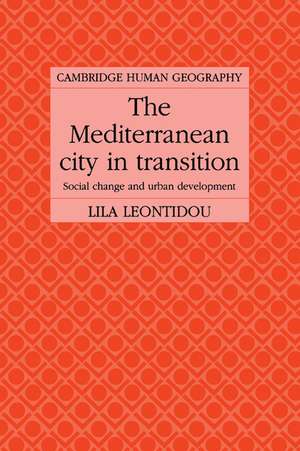The Mediterranean City in Transition: Social Change and Urban Development: Cambridge Human Geography
Autor Lila Leontidouen Limba Engleză Paperback – 29 mar 2006
| Toate formatele și edițiile | Preț | Express |
|---|---|---|
| Paperback (1) | 451.32 lei 6-8 săpt. | |
| Cambridge University Press – 29 mar 2006 | 451.32 lei 6-8 săpt. | |
| Hardback (1) | 807.83 lei 6-8 săpt. | |
| Cambridge University Press – 25 apr 1990 | 807.83 lei 6-8 săpt. |
Preț: 451.32 lei
Nou
Puncte Express: 677
Preț estimativ în valută:
86.36€ • 90.40$ • 71.88£
86.36€ • 90.40$ • 71.88£
Carte tipărită la comandă
Livrare economică 31 martie-14 aprilie
Preluare comenzi: 021 569.72.76
Specificații
ISBN-13: 9780521025256
ISBN-10: 0521025257
Pagini: 316
Dimensiuni: 152 x 229 x 22 mm
Greutate: 0.46 kg
Editura: Cambridge University Press
Colecția Cambridge University Press
Seria Cambridge Human Geography
Locul publicării:Cambridge, United Kingdom
ISBN-10: 0521025257
Pagini: 316
Dimensiuni: 152 x 229 x 22 mm
Greutate: 0.46 kg
Editura: Cambridge University Press
Colecția Cambridge University Press
Seria Cambridge Human Geography
Locul publicării:Cambridge, United Kingdom
Cuprins
List of figures; List of tables; Preface; List of abbreviations; Introduction; 1. Spontaneous urban development: in search of a theory for the Mediterranean city; 2. Cities of silence: Athens and Piraeus in the early twentieth century; 3. The Greek 'economic miracle' and the hidden proletariat; 4. The 'golden period' of spontaneous urban development, 1950–67; 5. Industrial restructuring versus the cities; 6. The end of spontaneity in urban development; 7. Athens and the uniqueness of urban development in Mediterranean Europe; References; Index.
Recenzii
"Using secondary sources for comparisons with other Mediterranean cities and archival studies for Athens, Leontidou has amassed considerable evidence--much of it presented in tables and maps--about how working-class migrants provided shelter for themselves in an unregulated building economy. Taken as an empirical account, Leontidou's book fills a gap in the literature." Josef W. Konvitz, Journal of Interdisciplinary History
Descriere
Focusing upon Greater Athens between 1948 and 1981 - the crucial period of the transition - Lila Leontidou explores the role of social classes in urban development.






















